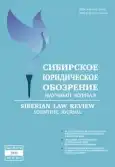The Right to a Fair Trial in the Area of Russian and Austrian Public Law
- Authors: Karamanukyan D.T.1, Chvosta P.2
-
Affiliations:
- Сибирский юридический университет
- Austrian Federal Administrative Court
- Issue: Vol 19, No 1 (2022)
- Pages: 91-108
- Section: АДМИНИСТРАТИВНОЕ ПРАВО, АДМИНИСТРАТИВНЫЙ ПРОЦЕСС (архивный раздел)
- Published: 04.05.2022
- URL: https://bakhtiniada.ru/2658-7602/article/view/349727
- DOI: https://doi.org/10.19073/2658-7602-2022-19-1-91-108
- EDN: https://elibrary.ru/CZMQCQ
- ID: 349727
Cite item
Full Text
Abstract
The research paper examines the legal category of procedural (proceedings) law “Right to a Fair Trial” as a fundamental element of the European Human Rights Convention and the judicial practice of the European Court of Human Rights. The Authors concentrate mainly on the general part of Article 6 and focus on crucial aspects of the mentioned right which have become significant for the daily legal practice in the Russian Federation, Republic of Austria and other member states. In the domestic Russian legal doctrine, there are sectoral and international legal studies devoted to the Convention for the Protection of Human Rights and Fundamental Freedoms, the functioning of the European Court of Human Rights and the legal nature of its acts (A. Abashidze, E. Alisevich, M. Biryukov, S. Kalashnikova,V. Tumanov, K. Aristova).Along with this, from the standpoint of conventional rights, Russian legal scholars studied the procedural features of the implementation of acts of the European Court of Human Rights and the application of conventional norms in civil, arbitration and criminal cases (I. Vorontsova, T. Solovieva, M. Glazkova, S. Afanasiev, L. Volosatova, E. Iodkovsky, K. Mashkova, etc.).The private-scientific research methods used by the Authors in the presented scientific article, predominantly comparative, require the study of the works of foreign scholars in the field of law, which include P. Leanza, O. Pridal, D. Spielmann, V. M. Zupancic, H. Mosler, A. Buyse. Despite the rather large volume of doctrinal sources on the nature and implementation of conventional rights, the issues of applying the right to a fair trial in administrative disputes and cases arising from public law relations have not become the subject of scientific research. The empirical basis of the study conducted by the Authors is composed of 66 pilot judgments and other acts of the European Court of Human Rights on complaints from individuals against Russia, Austria, France, Finland, the Netherlands, Great Britain, Switzerland and other member states of the Council of Europe; judicial acts of the courts of Russia, Austria and other European countries. It is concluded that the practice of Article 6 of the European Human Rights Convention by the European Court has had a remarkable and sometimes unprecedented impact on public law and law enforcement activities of the European countries that are parties to the Convention. As Russian and Austrian experience shows, the decision of the European Court on behalf of the enforcement of Article 6 in one specific case can induce the state not only to adopt a separate law, but also to carry out serious institutional changes. Many such examples are given below by the Authors, which testify that the decisions of the European Court are able to act as a powerful law-forming force on the national level.
About the authors
David T. Karamanukyan
Сибирский юридический университет
Author for correspondence.
Email: davo_lawyer@mail.ru
ORCID iD: 0000-0003-3401-9298
SPIN-code: 1120-0896
Provost, Candidate of Legal Sciences, Associate Professor
Russian Federation, ул. Короленко, 12, Омск, 644010Peter Chvosta
Austrian Federal Administrative Court
Email: peter.chvosta@bvwg.gv.at
ORCID iD: 0000-0003-1902-4128
Judge, Doctor of Law
Austria, 192-196 Erdbergstraße, Vienna, 1030References
- Leanza P., Pridal O. The Right to a Fair Trial: Article 6 of the European Convention on Human Rights. Alphen aan den Rijn: Wolters Kluwer; 2014. 276 p.
- Spielmann D. The European Convention on Human Rights. The European Court of Human Rights. In: Oliver D., Fedke J. (Eds.). Human Rights and the Private Sphere. A Comparative Study. London, New York: Routledge-Cavendish, 2007. P. 427-464.
- Zupančič В. M. On the Interpretation of Legal Precedents and of the Judgments of the European Court of Human Rights. In: Miller R. A., Zumbansen P. C. (Eds.). Annual of German and European Law. Vol. II/III (2004/2005). New York, Oxford: Berghahn Books, 2007. P. 156-170.
- Mosler H. Problems of Interpretation in the Case Law of the European Court of Human Rights. In: Kalshoven F. (Ed.). Essays on the Development of the International Legal Order. In Memory of Haro F. Van Panhuys. Alphen aan den Rijn: Sijthoff & Noordhoff, 1980. P. 149-167.
- Buyse A. The Pilot Judgment Procedure at the European Court of Human Rights: Possibilities and Challenges. Nomiko Vima (The Greek Law Journal). 2009;57:1890-1902.
- Føllesdal A. Peters B., Ulfstein G. (Eds.). Constituting Europe: The European Court of Human Rights in a National, European and Global Context. Cambridge: Cambridge University Press, 2013. 442 p.
- Ksenofontova N. G. “Reasonable time” in the Judgments of the European Court of Human Rights. In: Russian and European Human Rights Systems: Correlation and Problems of Harmonization. Nizhny Novgorod: Open Society Institute; 2003. P. 403-410.
- Neshataeva T. N. Consideration of a Dispute About Civil Rights Within a Reasonable Time. Bulletin of the Supreme Arbitration Court of the Russian Federation. 1999;7:72.
Supplementary files












